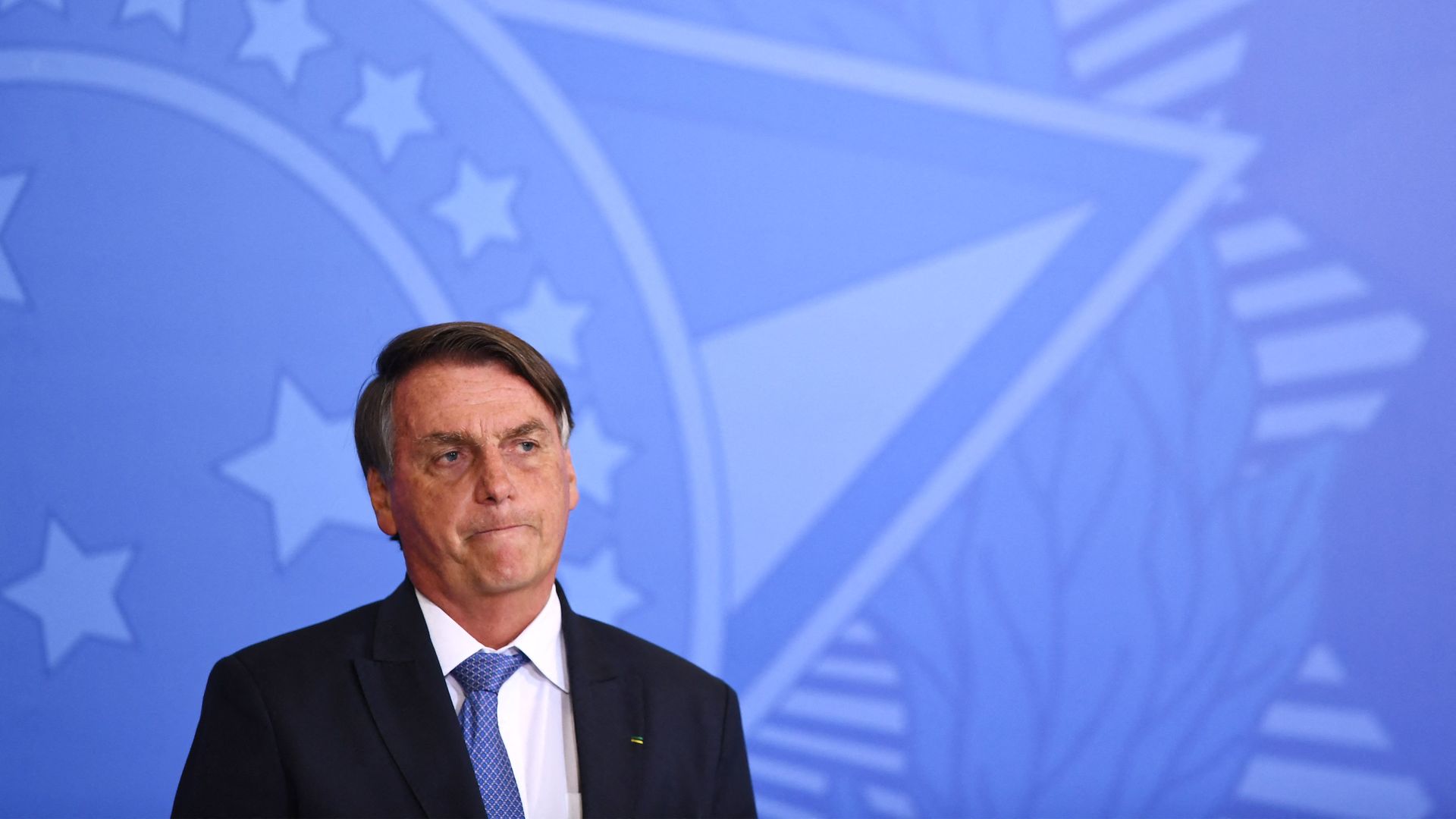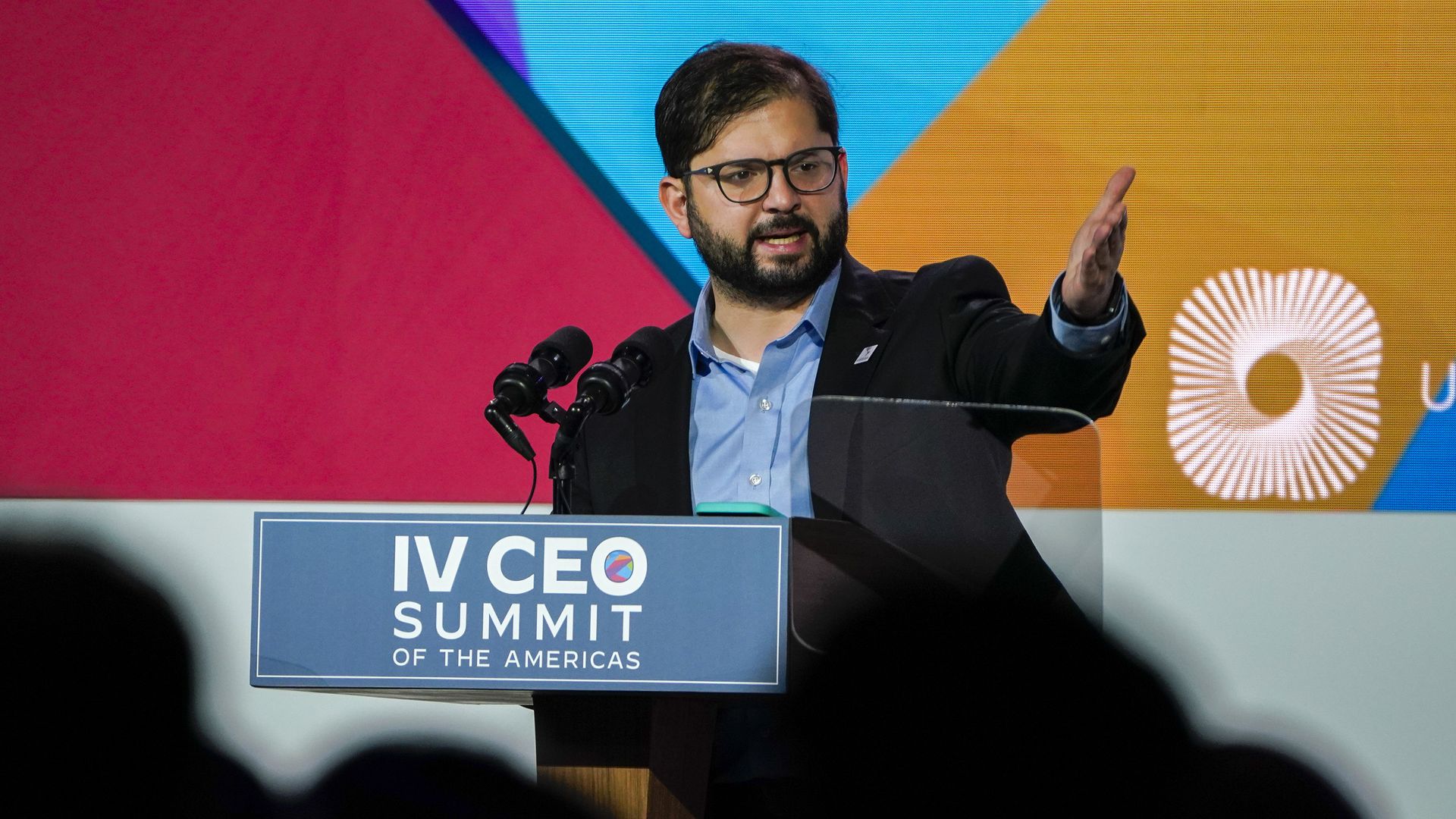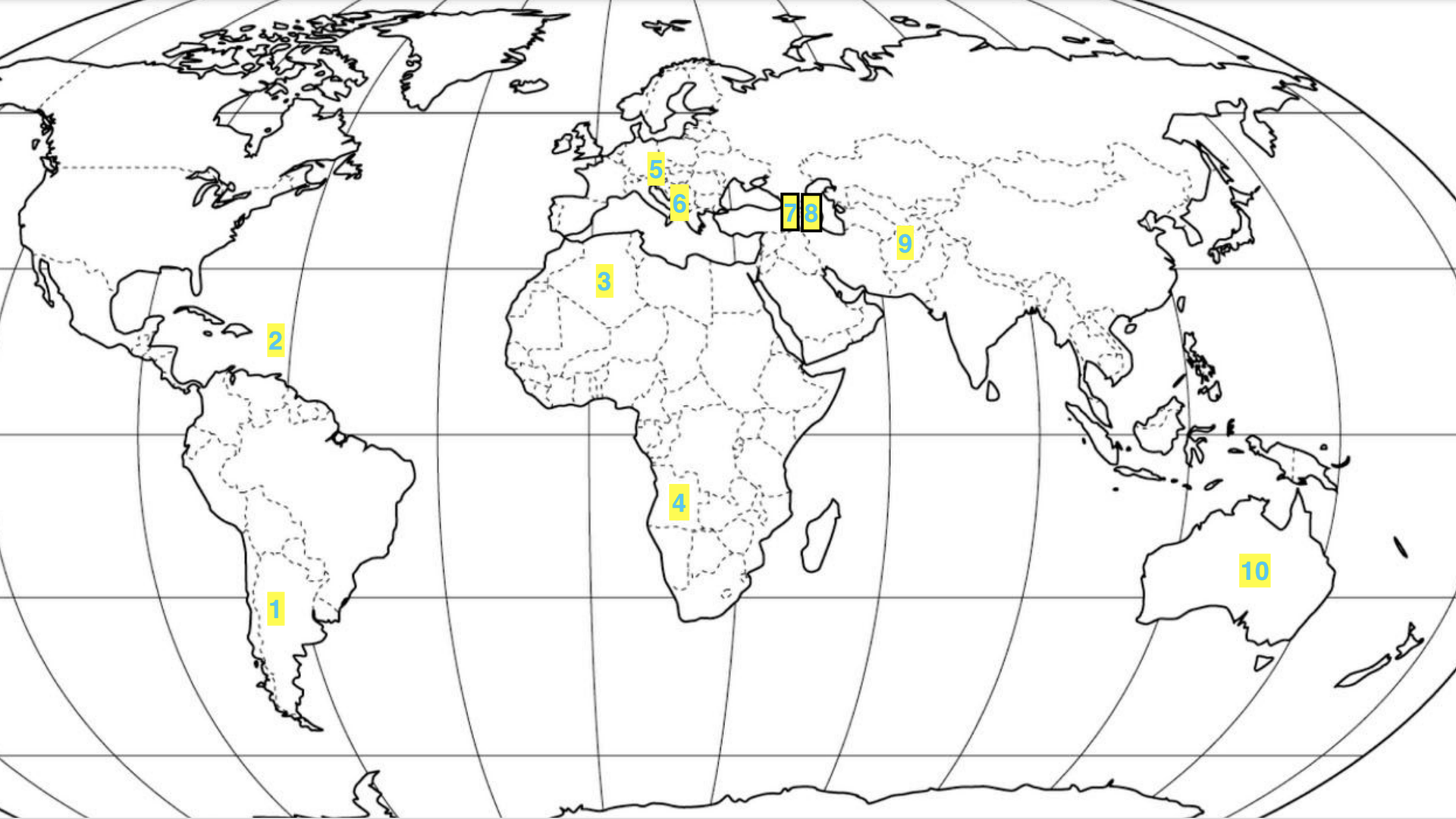| |
| |
| |
| Presented By Stanford Institute for Human-Centered Artificial Intelligence |
| |
| Axios World |
| By Dave Lawler · Jun 09, 2022 |
| Welcome back to Axios World. - We're starting off tonight's edition (1,986 words, 7½ minutes) with the Summit of the Americas in Los Angeles.
New arrival? Subscribe. |
| |
| |
| 1 big thing: Summit of Americas underscores regional divides |
 |
|
| President Biden speaks at the Summit of the Americas today. Photo: Anna Moneymaker/Getty Images |
| |
| This week's Summit of the Americas was never going to be exhibit A for international cooperation. Even if the region was a top priority for President Biden (it isn't), he doesn't have all that many natural partners to work with. Driving the news: Much of the focus this week has been on who's not in Los Angeles for the first regional summit since 2018, and the first in the U.S. since 1994. - The authoritarian leaders of Cuba, Nicaragua and Venezuela weren't invited, leading to a boycott from Mexican President Andrés Manuel López Obrador and fellow leftist leaders from Bolivia and Honduras.
- Guatemalan President Alejandro Giammattei and Salvadoran President Nayib Bukele are also skipping. Both have sparred with the Biden administration over corruption, and Bukele declined a call from Secretary of State Tony Blinken ahead of the summit, per the NYT.
- The absences of all three Northern Triangle leaders undermines the Biden administration's focus this week on the work led by Vice President Harris on the root causes of migration.
- Juan Guaidó, the Venezuelan opposition leader recognized by Washington as the country's legitimate interim president, also wasn't invited to LA, though he did get a call from Biden.
Between the lines: The Biden administration has tried to downplay the boycotts and stressed that inviting dictators would undermine previous regional commitments to democracy. - Still, the snubs are an overt challenge to the authority of the regional hegemon.
Biden still doesn't have many ideological allies among those who are in Los Angeles, apart from Canadian Prime Minister Justin Trudeau. - U.S.-friendly Colombian President Iván Duque was seated alongside Biden as the summit opened, but he's on the way out the door and the race to replace him is down to candidates from the hard left and the populist right.
- Biden had to offer Brazilian President Jair Bolsonaro a meeting to get him to come (see item 2). It's unlikely either will enjoy it.
- South American politics have been shifting to the left, and the presidents of Argentina, Chile and Peru have all railed against "neoliberalism," a byword for U.S. ideological influence in the region. Biden did appeal to progressives in his opening speech, though, winning applause by rebuking "trickle-down economics."
There are a handful of leaders who do want deeper relations with the U.S., but feel they aren't getting it. - Ecuadorian President Guillermo Lasso raised his desire for a free trade deal with the U.S. in remarks at a business event on the sidelines of the summit. He's unlikely to get one from Biden, who has spurned any such agreements. Instead, Lasso is currently negotiating one with Beijing.
- Pressed by the BBC ahead of the summit on his own moves to deepen trade ties with China, Uruguayan President Luis Lacalle Pou said, "I put my eggs where I can." He said U.S. officials "don't have a view of Latin America" — or at least one that applies to countries like his.
Still, there are major shared challenges across the region on issues like economic recovery, climate and migration, and the White House has prepared a series of announcements to be rolled out today and tomorrow. - One is the "Americas Partnership for Economic Prosperity," a still-in-progress framework to enhance cooperation in areas like supply chains and clean energy.
- A senior administration official told reporters that "our most like-minded economic partners" will be invited to join. The official didn't name any countries in particular.
What's next: In his remarks this evening, Biden said he'd be putting forward proposals that are "a far cry" from what Donald Trump offered the region. Those include a regional plan for migration, to be unveiled tomorrow. |
    |
| |
| |
| 2. Biden meets Bolsonaro |
 |
|
| Bolsonaro. Photo: Evaristo Sa/AFP via Getty Images |
| |
| Brazilian President Jair Bolsonaro has questioned the legitimacy of Biden's victory over Donald Trump, mocked Biden's age and added to the administration's collective pre-summit headache by threatening to stay home. Driving the news: Bolsonaro only committed to making the trip after Biden promised a bilateral meeting, which was due to begin right as we were sending out this newsletter. It's clear he'd rather be meeting a different U.S. president, but finally meeting Biden (they hadn't previously spoken) will help Bolsonaro counter the narrative that he's isolated internationally. - Bolsonaro sought a promise that Biden wouldn't criticize him over deforestation in the Amazon and his baseless claims that October's election in Brazil might be rigged, per AP.
- National security adviser Jake Sullivan dismissed that idea by telling reporters Biden would raise climate and "free and fair elections."
Neither leader is investing much in the relationship. - Polls suggest Bolsonaro is on course to be easily defeated by former President Luiz Inácio Lula da Silva in October.
- Meanwhile, Bolsonaro's supporters expect Biden to be a lame duck after the midterms and are banking on the return of Trump in 2024, writes Oliver Stuenkel of the Fundação Getulio Vargas.
What's next: This might not be Biden's most awkward meeting over the next few weeks. The White House is still working on plans for a potential visit to Saudi Arabia. |
    |
| |
| |
| 3. The most interesting man at the summit |
 |
|
| Boric at a Chamber of Commerce event on the sidelines of the summit. Photo: Kyle Grillot/Bloomberg via Getty |
| |
| Gabriel Boric, Chile's 36-year-old president, considered skipping the summit, but elected to attend. What he's saying: Boric has both criticized the human rights abuses in Cuba, Nicaragua and Venezuela — rare for a Latin American left-wing leader — and the U.S. for its "politics of exclusion." He told Telemundo it's "best to argue and confront face to face." - Jon Lee Anderson writes in a new New Yorker profile that Boric "knows that the crucial dichotomy in the region is less between left and right than between democracy and populist authoritarianism."
- When Vladimir Putin invaded Ukraine, many on the Latin American left remained neutral, but he condemned Russia immediately.
- He denounced Israel during his campaign as a "genocidal, murderous state" for its treatment of the Palestinians, then said he'd say the same about China and the Uyghurs.
If Boric seems willing to irk all of the major geopolitical players, that's also true of the factions within Chile. - He appointed a strikingly young, progressive Cabinet with a majority of women. But he infuriated some of his political allies on the left by picking an establishment stalwart as finance minister.
Boric has straddled the line between leftist and center-left since his time as a student leader. - When protests swept Chile in 2019, he was suspended from his own party for signing an agreement seeking to pacify the country and move toward a new constitution.
- Soon after, he was sitting in a park when leftists denounced him as a traitor, "soaked him with beer and spat on him" as he "stayed seated and quietly stared them down," Anderson writes.
State of play: Boric's coalition is in the minority in parliament, and it's deeply divided. The constitutional process has been rocky. Boric's approval rating has fallen sharply since taking office in March. - Boric told Anderson he sees an opportunity to "reimagine the left." But he also comes off as unusually humble for a political wunderkind, and he's well-aware of — perhaps even a bit daunted by — the challenges ahead.
Read the New Yorker profile. |
    |
| |
| |
| A message from Stanford Institute for Human-Centered Artificial Intelligence |
| AI-powered robots are changing the world |
| |
 |
| |
| The global market for robots is expected to reach $510 billion by 2026 — are you prepared for the next wave of change? Read this overview of the latest research on AI-powered robotics and its impact on vital industries, including healthcare, transportation and home services. |
| |
| |
| Bonus: Where in the world? |
 |
|
| Courtesy of Worldblankmap.com |
| |
| Today's quiz starts right from the very beginning... of the alphabet. Can you name the 10 countries labeled here whose names begin with A? - I've left off Andorra, which seems a bit too small to make two quizzes in a row. Apologies for the slightly wonky map.
Scroll to the bottom for the answers. |
    |
| |
| |
| 4. U.S. pledges cash to fight hunger in Latin America |
 |
|
| Illustration: Sarah Grillo/Axios |
| |
| The Biden administration is committing $331 million to fight food insecurity in Latin America and the Caribbean, with more efforts still to be announced this week at the Summit of the Americas, Axios' Stef Kight writes from LA. Why it matters: The UN's World Food Program reports that half a million people in Latin America and the Caribbean fell into severe food insecurity in the first three months of 2022. - While COVID-19 had weakened food security in the region, Russia's blockade of Ukrainian exports are now "a massively exacerbating factor," USAID administrator Samantha Power told Axios.
- The region will need "every last ounce" of U.S. emergency assistance, particularly as donor countries in Europe are more focused on the needs of Ukrainian refugees and displaced people, Power said.
- Humanitarian aid also serves as a way for the U.S. to show its support for a region increasingly turning to China. "When it comes to humanitarian assistance, and who the largest contributors are in a crisis — that's not an area that China has moved into," Power told Axios.
- Details: The $331 million will target El Salvador, Honduras and Guatemala (the Northern Triangle), along with Haiti, Colombia and Peru, Power said.
The big picture: Stemming food insecurity is also linked to the U.S. priority of addressing migration. - "In all of the debriefs that get done with people who attempt to cross the border illegally and may be apprehended, over the years, you have seen food insecurity as a source of migration," Power told Axios.
Read the full story. |
    |
| |
| |
| 5. Data du jour: Where Russia's blockade hits hardest |
 Data: FAO; Table: Jacque Schrag/Axios The U.S. and Ukraine are accusing Russia of "blackmail" and "exporting starvation" by preventing most Ukrainian agricultural exports through a blockade of Black Sea ports. Why it matters: Without them on the market, prices are rising and the global food crisis is getting worse, Axios fellow Bálint Fabok writes. By the numbers: Ukraine accounted for 9% of global wheat exports, 15% for maize and 44% for sunflower oil in 2020. Many developing countries were far more reliant on Ukraine for those products prior to the blockade. - Those include some of the world's most populous countries. At least 25% of wheat exports in Bangladesh, Egypt, Indonesia and Pakistan came from Ukraine.
The latest: The UN and Turkey are trying to broker an agreement to allow Ukrainian exports to resume, which would require Russia to lift the blockade and Ukraine to remove mines from its ports. - Ukrainian officials say they can't trust Russia not to use the agreement to gain a military advantage.
- Meanwhile, Ukraine has 30 million tons of grain sitting in silos. That accounts for more than half of the available storage space even before the new harvest begins this summer, per Reuters.
|
    |
| |
| |
| 6. Global news roundup |
 |
|
| Supporters hold a vigil outside Brazil's Embassy in London and call on Brazilian authorities to find Dom Phillips and Bruno Araújo Pereira on June 9. Photo: Victoria Jones/PA Images via Getty Images |
| |
| 1. Brazilian authorities are searching for British journalist Dom Phillips and Indigenous advocate Bruno Araújo Pereira, who went missing earlier this week in a remote area of the Amazon after receiving threats. - The Guardian, where Phillips regularly contributed, called on the international community to put pressure on Brazilian officials to do more to investigate the pair's disappearance.
- The big picture: Latin America is the deadliest place for environmental and Indigenous defenders, according to NGO Global Witness.
2. Tensions between the Democratic Republic of Congo and Rwanda continued to escalate this week after the DRC accused its neighbor of sending 500 special forces in disguise into its territory — an accusation Rwanda's army rejected, per Reuters. 3. Two British citizens and a Moroccan national today were sentenced to death by a court in the self-proclaimed Donetsk People's Republic for fighting on behalf of Ukraine, according to Russian state media. - U.K. officials condemned the sentencing and said the men should be granted certain protections as prisoners of war, Axios' Jacob Knutson writes.
4. The Biden administration has rolled back a Trump administration decision to place the department that deals with Palestinian affairs within the U.S. Embassy to Israel, Axios' Barak Ravid reports. 5. IAEA head Rafael Grossi said today that Iran's decision to disconnect 27 cameras at several nuclear sites poses a "serious challenge" for UN inspectors and could be a "fatal blow" to negotiations aimed at reviving the 2015 Iran nuclear deal. Read more. |
    |
| |
| |
| 7. Stories we're watching |
 |
|
| Evening on the Amazon River. Photo: Mauro Pimentel/AFP via Getty |
| |
- Labor unions warn Biden not to lift China tariffs
- Kansas woman pleads guilty to leading all-female ISIS battalion
- IAEA board criticizes Iran
- Israelis push U.S. to remove NSO from blacklist
- Zelensky says Ukraine launching database on Russian war crimes
- Heat waves could soon have names
- WHO doesn't recommend mass vaccination against monkeypox
Quoted: "It's an unfortunate reflection of the world we live in that the international community is only now paying attention to monkeypox because it has appeared in high-income countries." — WHO chief Tedros Adhanom Ghebreyesus |
    |
| |
| |
| A message from Stanford Institute for Human-Centered Artificial Intelligence |
| Making autonomous vehicles and robots safe for humans |
| |
 |
| |
| Autonomous vehicles and robots are poised to transform today's transportation and logistics industry. Even better: Stanford researchers are developing better ways to improve the quality of robot navigation and the safety of self-driving cars using artificial intelligence. Learn how. |
| |
| Answers: 1. Argentina; 2. Antigua and Barbuda; 3. Algeria; 4. Angola; 5. Austria; 6. Albania; 7. Armenia; 8. Azerbaijan; 9. Afghanistan; 10. Australia. |
 | It's called Smart Brevity®. Over 200 orgs use it — in a tool called Axios HQ — to drive productivity with clearer workplace communications. | | |












No comments:
Post a Comment